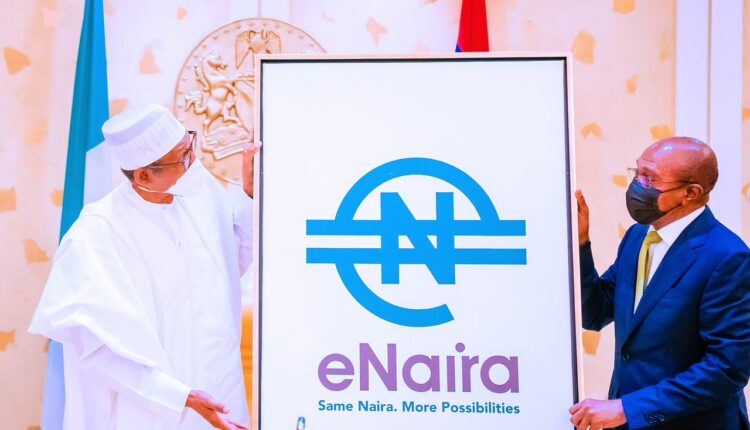eNaira: 3 years after, Nigeria’s digital currency struggles to be adopted
By Quadri Adejumo
In October 2021, Nigeria became the first African country and the second universally to launch a Central Bank Digital Currency (CBDC), the eNaira.
Unlike cryptocurrencies, the eNaira’s value is fixed by the Central Bank of Nigeria (CBN) and is equivalent to the country’s fiat currency. The goal of this move was to offer consumers and businesses privacy, transferability, convenience, accessibility, and financial security.
The eNaira was envisioned by Nigeria’s apex bank as an innovative instrument for transforming the economy at its launch. Godwin Emefiele, former governor of the Central Bank of Nigeria, was in charge of this initiative, which aimed for nationwide adoption.
READ ALSO: EDITORIAL: Who will rescue Northern Nigeria monarchs from dethronements?

The adoption of the eNaira, on the other hand, remains disappointingly low after more than 30 months. Industry experts suggest the project has been sidelined, with minimal advancement reported in more than a year. “Despite Nigeria’s growing tech-savviness, the e-Naira has been a shadow of itself,” Oluwatomisin Badru, a financial analyst, told our reporter.
“Convincing people to switch from traditional naira notes to a digital counterpart requires more than just technology; it demands a cultural shift and this has not been managed well. It’s been sidelined with no attention towards it.”
Struggles of reception
Notwithstanding its true capacity, the eNaira has battled to build up traction among Nigerians. Sola, a university student in Ibadan, says he’s never used the eNaira. “Most places I shop don’t know about it, nobody uses it. No one ever mentions the eNaira. I feel the publicity around it is just too low,” he told our reporter.
For Tolani Ade, a small business owner in Lagos, she recalls the buzz around the eNaira’s launch. “I remembered when it was launched and how it was said it’ll make transactions easier for business owners like myself,” she told our reporter, adding that since the launch, she hasn’t seen anyone ask to pay with the eNaira.
Seun Jane, a freelance website developer, initially had high hopes for the eNaira. “When it was launched, I thought it would make my transactions smoother, especially with my line of work.”
However, Seun’s experience has been one of frustration. “I tried using it a few times, but it was complicated. I just had to move on.”
Seun further proposed that the authorities make the experience less complicated. “If the government wants us to use the eNaira, they need to make it work and simple to use.”
According to a 2023 International Monetary Fund (IMF) report, only 0.5% of the population used the eNaira within its first year. Furthermore, 98.5% of eNaira wallets were inactive one year after its launch.
The IMF, in its Nigeria ‘Staff Report for the 2024 Article IV Consultation’ highlighted that while 13 million eNaira wallets have been created, the majority remain inactive. Since its inception, the eNaira has facilitated only N29.3 billion worth of transactions, IMF said. To place into point of view how subpar that is, the worth of electronic transactions in Nigeria was N611.06 trillion in 2023 and N237 trillion in Q1 2024.
Reviving the eNaira
In March 2024, the CBN reported a partnership with blockchain firm Gluwa to improve the eNaira’s functionality, drive financial inclusion, and foster development. Despite this effort, there have been no substantial updates since the announcement.
The focus of the CBN under new Governor Yemi Cardoso appears to have shifted. Reports suggest the bank is developing a new CBDC, the cNGN, to be managed by tier-one banks, potentially sidelining the eNaira further.
Similar to well-known stablecoins like USDT and USDC, the cNGN will be compatible with multiple public blockchains, enabling straightforward international transfers and expanding its use globally.
Mirroring the functionality of major stablecoins, the cNGN boasts interoperability with other public blockchains. This feature enables seamless global transfers, extending its utility beyond Nigerian borders.
The cNGN is a compliant and regulated consortium-driven stablecoin, pegged to the Naira in the Reserve Bank account. Unlike the eNaira, which is developed solely by the apex bank, the cNGN is managed by a consortium.
Factors hindering growth
Several factors have contributed to the eNaira’s slow adoption. Badru cited a lack of publicity as a major issue. “Communication and public awareness have also played a critical role in the eNaira’s slow adoption,” he said.
He further explained; “Many Nigerians are still unclear about the benefits of the eNaira or how to use it effectively. The digital currency’s rollout needed a robust campaign to instill confidence among potential users.”
Compounding this issue is the competitive landscape of Nigeria’s financial technology sector. Traditional banks, and mobile money platforms and digital payment solutions like Flutterwave and Paystack have already established a strong foothold, offering convenience to Nigerians.
These platforms have become household names, trusted and widely used, leaving little room for the eNaira. Badru noted; “Many Nigerians remain unaware of how the eNaira works and continue to prefer traditional banking methods. This is because the ways of these banks are easier. And it has a higher acceptance rate among the public.”
READ ALSO: Northcentral states domestic debts reduced significantly in Q1, 2024
Despite these challenges, there is hope for the eNaira. For this to happen, experts believe major issues must be addressed. “For a digital currency to succeed, it must offer a seamless user experience, something the eNaira has yet to consistently deliver,” Adewale Boluwatife, a business analyst, told our reporter.
The progress of the eNaira will rely upon overcoming the gap between publicity and acceptance, ensuring that the digital currency can truly integrate into the everyday lives of its citizens. “There must be an emphasis on public education. A comprehensive campaign to raise awareness and understanding of the eNaira’s benefits and functionalities is crucial,” Boluwatife added.



Comments are closed.